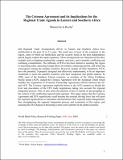| dc.description.abstract | Sub Regional Trade Arrangements (RTA) in Eastern and Southern Africa have proliferated in the past 10 to 15 years. The small size of most of the countries in the region, some of which are landlocked, and the security needs in the post independence period largely explain the rapid expansion. These arrangements are characterized by their multiple and overlapping membership, complex structures, and eventually conflicting and confusing commitments. The influence of RTAs has been limited to assisting the region in increasing trade, attracting foreign direct investment, enhancing growth, and achieving convergence among the member countries. However, despite all their limitations, RTAs have the potential, if properly designed and effectively implemented, to be an important instrument to assist the member countries with their integration into global markets. In 1998, most of the Southern African countries, as members of the Africa Caribbean Pacific group (ACP), signed the Cotonou Agreement with the European Union which includes the negotiation of Economic Partnership Agreements (EPAs) between the EU and ACP. The Cotonou Agreement explicitly leaves to the ACP countries to decide the level and procedures of the EPA trade negotiations taking into account the regional integration process. This, in turn raises the question of how to decide on the groupings in the context of the conflicting regional trade agendas. This paper argues that the Cotonou Agreement and EPA negotiations could become the external driving force that will push the regional organizations to rationalize and harmonize their regional trade arrangements, thus strengthening the regional integration process and economies of the region, and assisting the ESA Region in becoming a more active partner in the global economy. | en |

